What is King (Raja) Satya Harishchandra story (Vishwamitra, Vashishtha fight)
Namaste friends, how are you doing today? Welcome to #BhagavanBhakthi website / blog.
Bhagavan Lord Sri Krishna (Vishnu) (Rama) (Narayana) (Trivikrama) (Narasimha) and Goddess Sri Rukmini Devi (Lakshmi) (Sita) (Jaya) (Maya) (Sridevi) blessings to you and your family!
In this website / blog, you will always learn about #Hinduism #Sanskrit language.
Also subscribe to my YouTube channel from this link #BhagavanBhakthi to view videos about #Hinduism #Sanskrit language.
Just before going to “King (Raja) Satya Harishchandra story (Vishwamitra, Vashishtha fight)“, let us know a brief, basic and very important information.
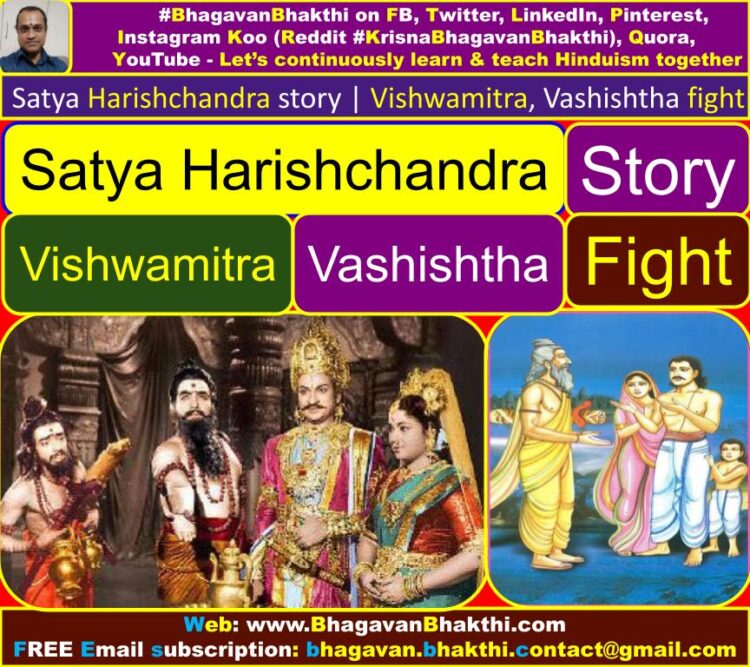
King Satya Harishchandra wife name is Taramati (Also called as Shaivya). King Satya Harishchandra son name is Lohitashva (Also called as Rohitashva).
King Satya Harishchandra father name is Trishanku (Also called as Satyavrata). King Satya Harishchandra belonged to the great lineage of Suryavansh (Suryavanshi) (Suryavamsha) (Solar Dynasty).
What is King Harishchandra known for – King (Raja) Harishchandra known for his Satya-Nishta ((Truth is loyalty). He has never broken his word. Whatever he had promised he has fulfilled in his life. This is the greatness of the great King (Raja) Harishichandra and thus he got the name Satya Harishchandra.
Who came first Ram or Harishchandra – Harishchandra comes in the lineage of King Ikshvaku. Later in the same lineage Ram, an avatar of Lord Sri Vishnu takes the avatar. But, Lord Sri Rama is present since the unknown age in the higher planets like Vaikuntha.
In which family was Harishchandra born – Harishchandra was born in the family and lineage of King Vaivasvata Manu or Satyavarta, King Ikshvaku, King Kukshi, King Prithu, Lord Chandra, King Ambarisha, King Trishanku (Satyavrata).
Story of King (Raja) Satya Harishichandra (Maharshi Vasishtha and Maharshi Vishwamitra fight story) is as given below:
In Treta Yuga, there was a king named Harishchandra (He was famously known as King Satya Harishchandra, as he was always talking satya / truth).
Once King Satya Harishchandra was hunting in the Mahabahu (महाबाहु / Mahābāhu) forest. At that time, suddenly King Satya Harishchadra heard loud cries of a woman- ‘Save me! Save me!‘ It was followed by the cries of many women.
Hearing those cries, King Satya Harishchandra shouted loudly- ‘Don’t be afraid‘ and he immediately dashed in the direction of the cries. The cries however were an illusion created by Vighnaraja, the lord of the obstacles remover (Lord Sri Ganesha).
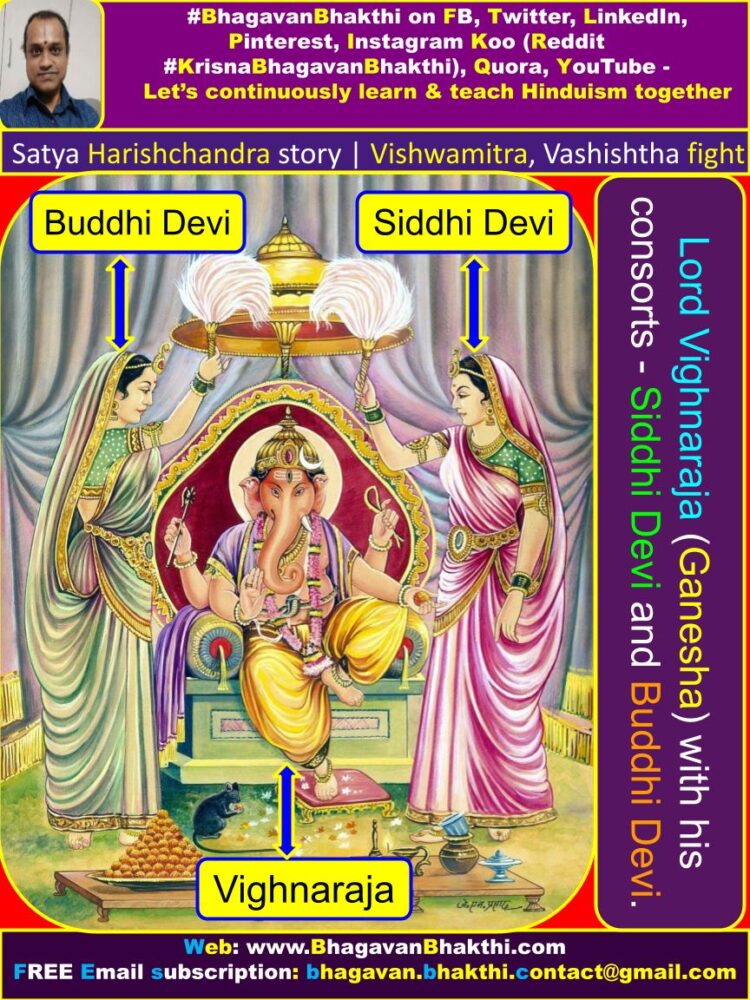
At that time when King Satya Harishchandra heard those cries, Maharishi (Brahmarishi (Sage) Vishwamitra was observing severe penance in the forest. In order to test King Satya Harishchandra’s virtuosity, Vighnaraja (Lord Sri Ganesha) entered his body.
As soon as Vighnaraja (Lord Sri Ganesha) entered King Satya Harishchandra’s body, he (King Satya Harishchandra) lost his temper. And King Satya Harishchandra began to abuse Maharishi (Brahmarishi) (Sage) Vishwamitra, which enraged him.
Maharishi Vishwamitra’s anger destroyed all the knowledge, he had acquired due to his severe penance. Seeing the angry of Maharishi Vishwamitra, King Satya Harishchandra began to shiver.
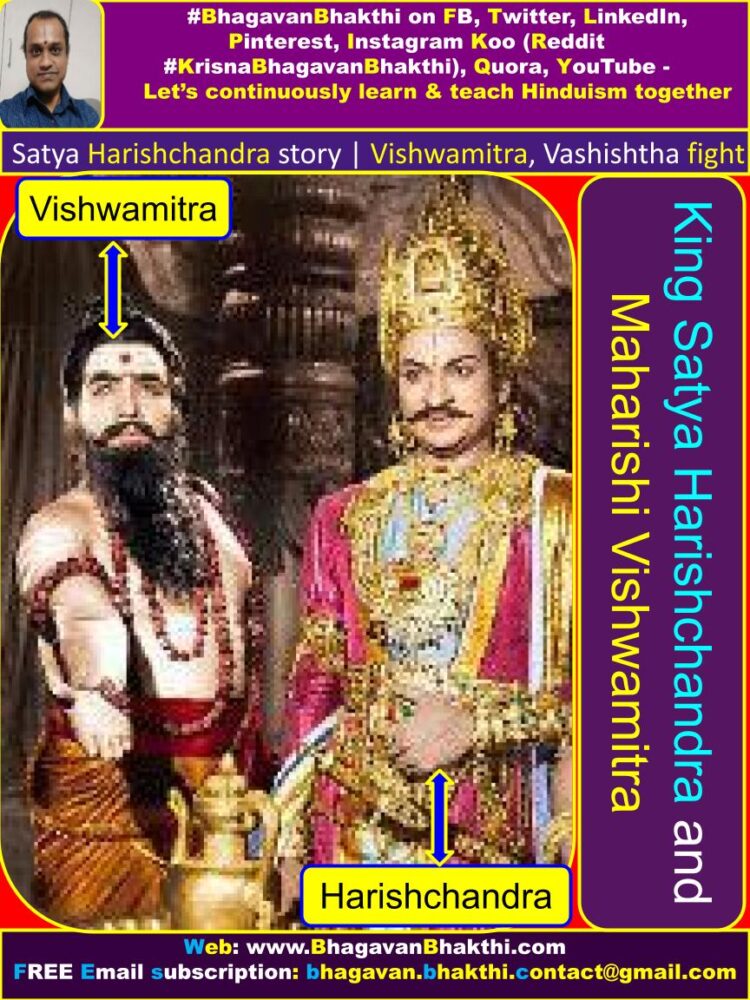
With folded hands, King Satya Harishchandra begged Maharishi Vishwamitra’s pardon. Harishchandra said- ‘O great sage! It is my duty to protect the subjects. Kindly forgive me. Your wrath could greatly affect the performance of my duties as a king’.
Maharishi Vishwamitra said- ‘O king! If you are a true follower of religion, tell me, who should be given a donation? Who should be protected and who should be fought with?’
King Satya Harishchandra answered- ‘O great penancer! Donations should be made only to such a Brahmin who indulges in fast and religious actions.’ ‘Protection should be extended to those who are afraid and battle should be fought with enemies.’
Maharishi Vishwamitra said– ‘If you are a religious king, give me Dakshina (donation) as I am a Brahmin seeking salvation.’
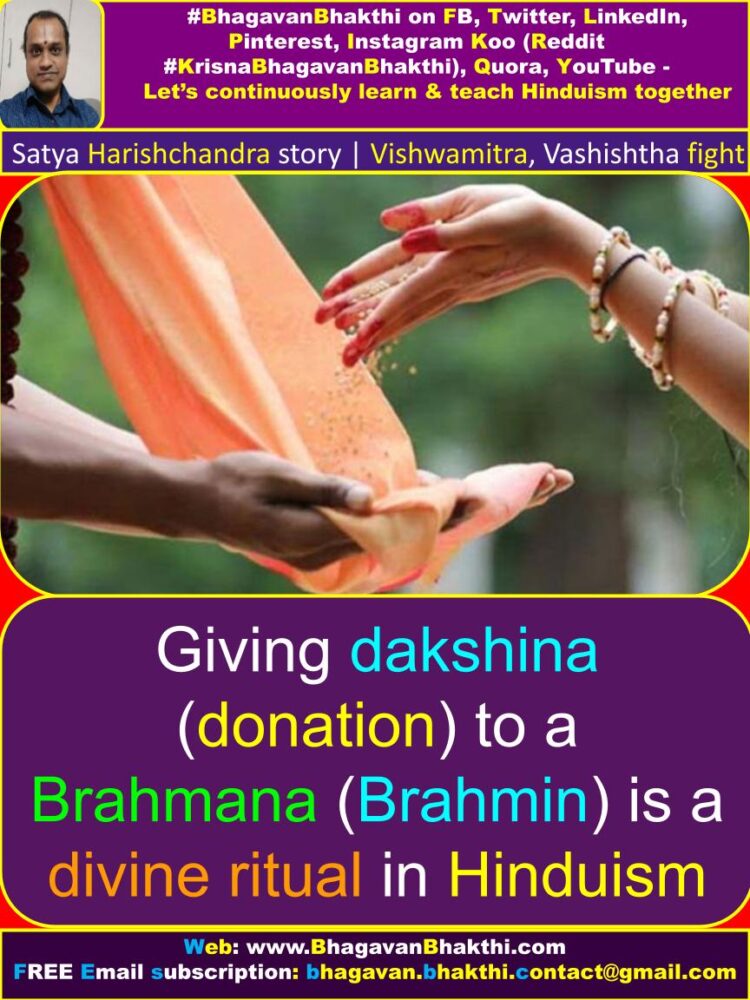
King Satya Harishchandra said- ‘Tell me your desire. I am ready to grant it.’
Maharishi Vishwamitra said- ‘O king! Just presume that I have received whatever you would donate me. Now, give me Dakshina (donation) for the Rajasuya Yagya.’
King Satya Harishchandra said- ‘Ask me whatever you wish to have as the Dakshina (donation) of Rajasuya Yagya.’
Maharishi Vishwamitra said- ‘O king! Give me all you have except your own body, your wife and child.’ Feeling pleased, King Satya Harishchandra granted what Maharishi Vishwamitra desired.
Maharishi Vishwamitra said- ‘O king! Tell me, who is the lord of your kingdom?’
King Satya Harishchandra said- ‘Since the moment I have presented this kingdom to you, you are its master.’
Maharishi Vishwamitra said- ‘If I am the master of this kingdom, what are you doing here? Leave at once!’ ‘But before leaving, remove all your clothes, ornaments and other royal insignia and go out wearing tree’s bark only.’
Thus after losing his kingdom, King Satya Harishchandra got ready to leave with his wife Shaivya (Taramati) and son Lohitashva (Rohitashva).
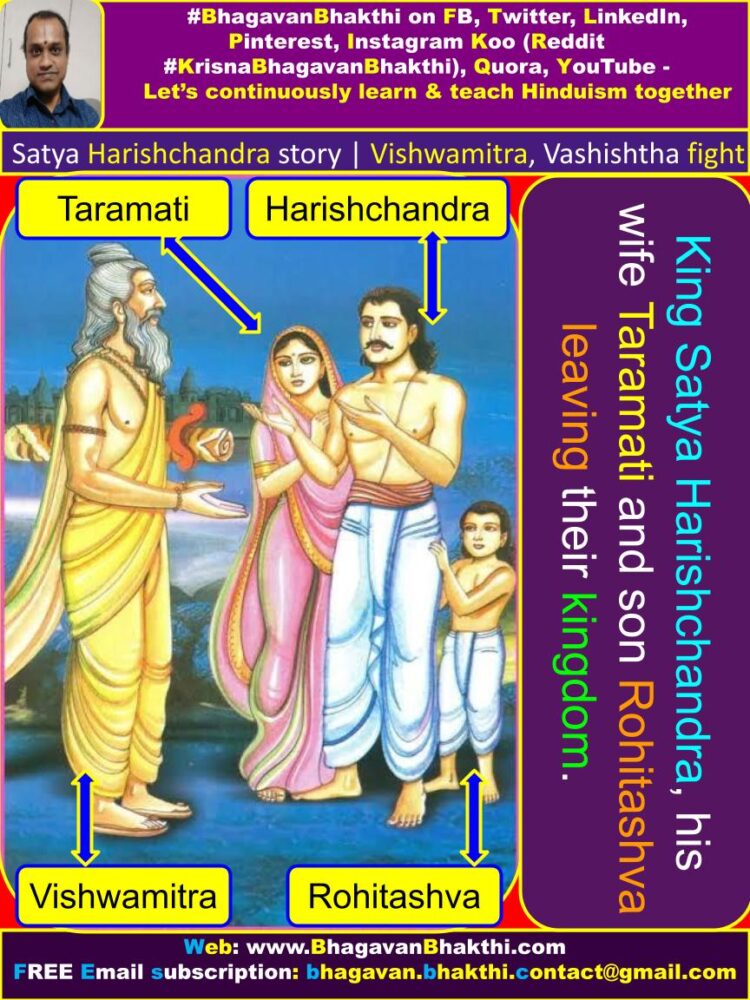
Maharishi Vishwamitra then intercepted him and said- ‘Where are you going without paying a Dakshina (donation) for Rajsuya Yagya.
King Satya Harishchandra said- ‘O lord! I have donated my whole kingdom. Now only our bodies remain with us. What can I give you now?’
Maharishi Vishwamitra said- ‘You cannot leave without paying a Dakshina (doantion) because you have promised me.’
King Satya Harishchandra said- ‘Don’t be angry, O Brahmin! I have nothing at present in my position, but I will definitely pay you your Dakshina (donation) in due time.’
Maharishi Vishwamitra said angrily- ‘Specify the time period within which you will give me my Dakshina (donation) or else be ready to get cursed by me.’
King Satya Harishchandra said- ‘I will pay the Dakshina (donation) within a month.’ Thereafter, King Satya Harishchandra started to live in seclusion with his wife Shaivya (Taramati) and child Lohitashva (Rohitashva).
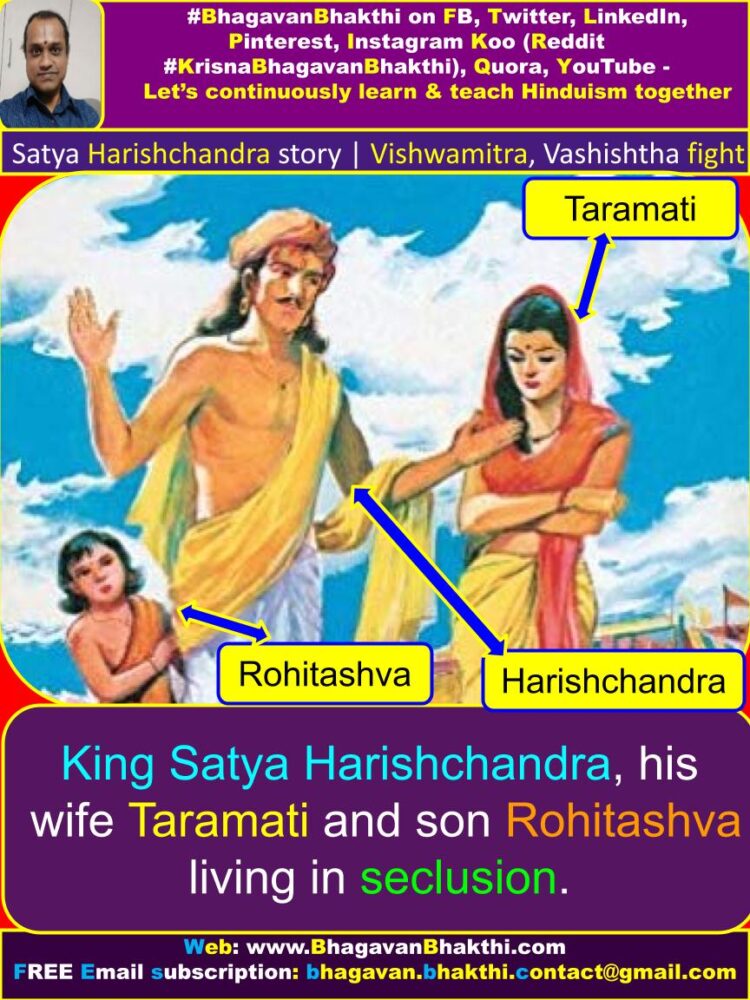
Seeing the king’s pitiable condition, his entire subjects began to follow him. Seeing their condition, King Satya Harishchandra halted and took a look on his subjects. At the same time, Maharishi Vishwamitra also arrived there and began to curse King Satya Harishchandra for having attachment towards his subjects.
Hearing the harsh words of Maharishi Vishwamitra, King Satya Harishchandra left the kingdom with his wife Shaivya (Taramati) and son Lohitashva (Rohitashva). To drive the king away as soon as possible, Maharishi Vishwamitra began to beat the queen’s back with a stick.
Maharishi Vishwamitra’s abhorrent action enraged the five guardian deities of the directions and they condemned him.
Enraged Maharishi Vishwamitra cursed them- ‘O sinners! Go and take birth as human beings.’
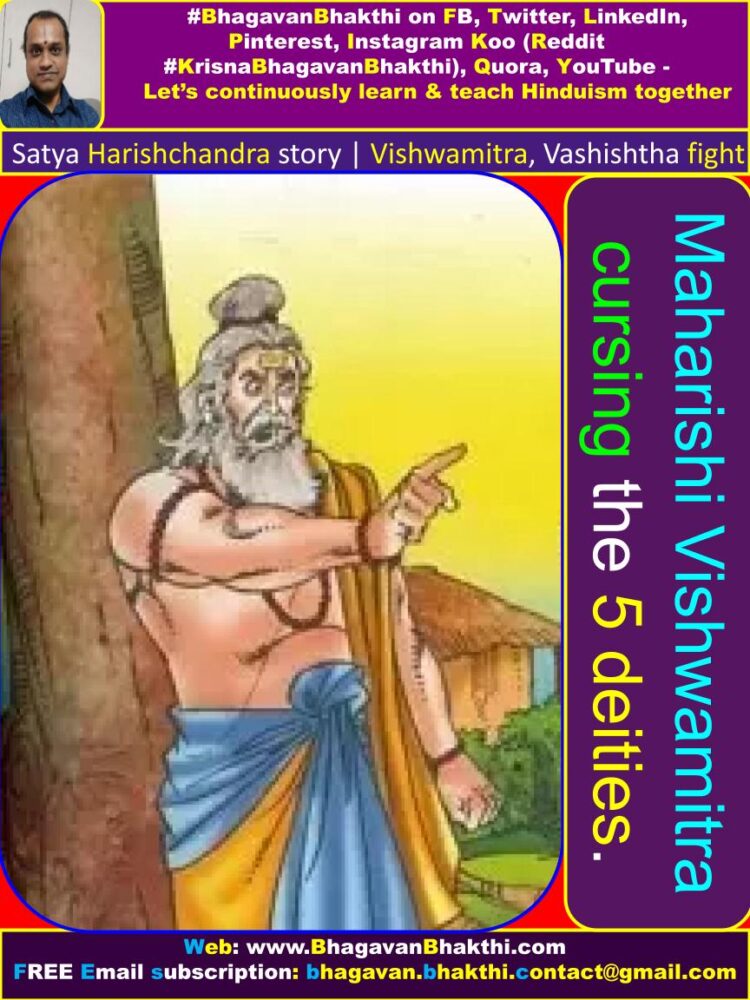
This curse of Maharishi Vishwamitra frightened the deities. They begged his pardon.
Pleased by their prayers, Maharishi Vishwamitra said- ‘My words cannot be undone. But despite having incarnation of human beings, you will remain bachelors throughout your life. You will never feel attachment and allurement for anybody.’
Thus due to Maharishi Vishwamitra’s curse, those five guardian deities took birth as the five sons of Sri Draupadi Devi.
[Note : These Sri Draupadi Devi’s 5 children are also known as Upapandavas, that is, sons of the Pandavas. These Upapandavas names are: Prativindhya (from Yudhishthira), Sutasoma (from Bheema), Shrutakarma (from Arjuna), Satanika (from Nakula) and Shrutasena (from Sahadeva).]
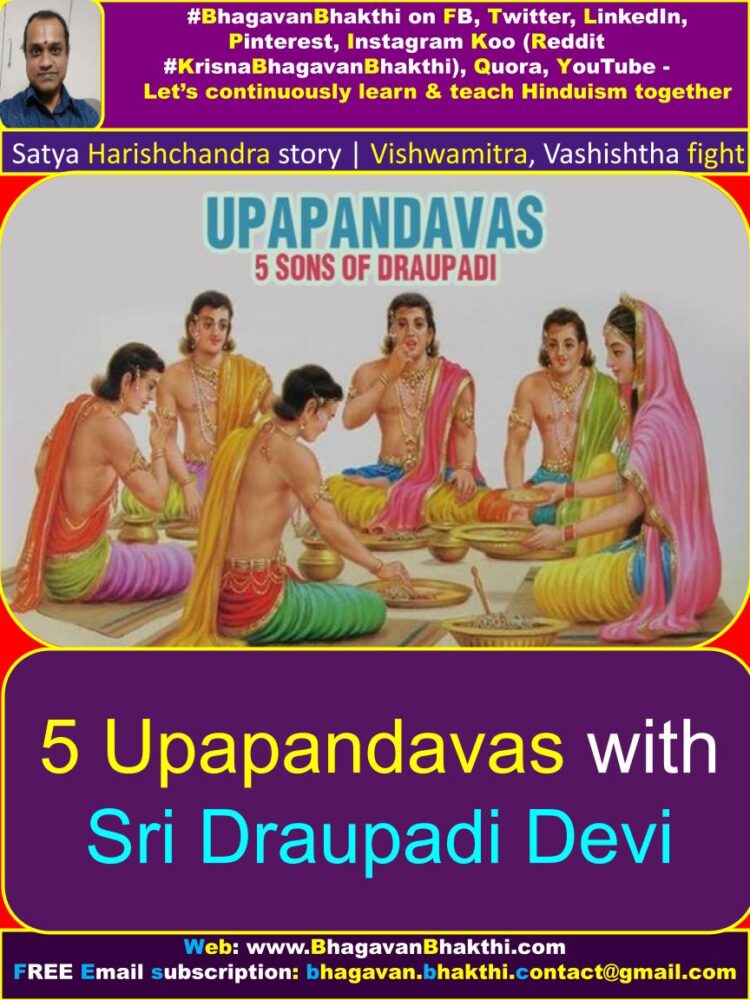
Dronacharya’s son, Ashwatthama, ultimately killed them. After being thrown out from his kingdom by Maharishi Vishwamitra, King Satya Harishchandra reached the holy town of Varanasi (Kashi), which was an abode of Lord Mahadeva (Shiva) (Vishwanath).
There King Satya Harishchandra saw Maharishi Vishwamitra standing before him.
Maharishi Vishwamitra said- ‘A month has been completed now. Now, give me my Dakshina (donation).’
King Satya Harishchandra said- ‘There is still half an hour in the completion of this month. Please wait. I will give your Dakshina (donation).’
Maharishi Vishwamitra said- ‘I will come after half an hour.’ Saying this, Maharishi Vishwamitra departed.
When Maharishi Vishwamitra left, King Satya Harishchandra started to worry as to what would happen to him in his next birth if he did not keep his promise made to a Brahmin. Seeing him perplexed, queen Shaivya (Taramati) tried to console King Satya Harishchandra.
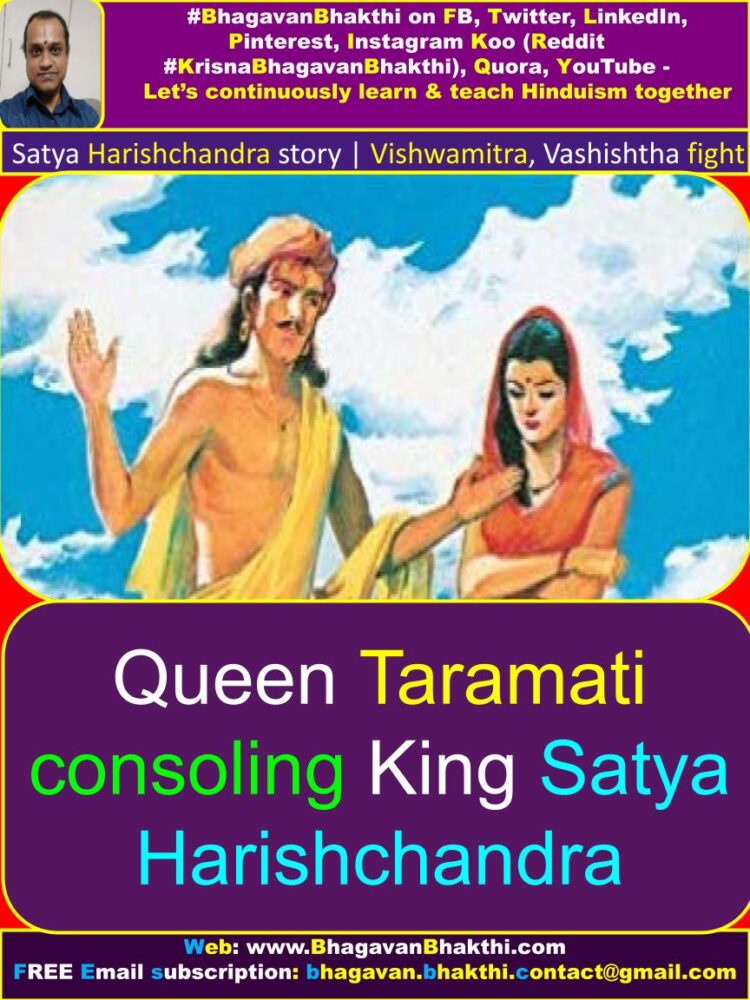
Shaivya (Taramati) said- ‘Man requires a wife only to produce a child. Now we already have a child- Rohitashva (Lohitashva).’ ‘Hence I am no longer useful for you. You sell me and pay the acquired wealth as Dakshina (donation) to the Brahmin.’
King Satya Harishchandra fainted after hearing his wife Shaivya (Taramati) words. The queen Shaivya (Taramati) began to wail at her husband King Satya Harishchandra condition. Thus wailing, the queen Shaivya (Taramati) also fell unconscious.
The little Lohitashva (Rohitashva) also felt perplexed by his parent’s condition. He began to cry- ‘O father! O mother! I am hungry. Give me food.’
At the same time, Maharishi Vishwamitra arrived there in the guise of Kaal.
After sprinkling water on King Satya Harishchandra’s face, Maharishi Vishwamitra made him conscious and said – ‘O king! Get up and pay my Dakshina (donation). Your sorrows will increase if you do not fulfil your promise.’
King Satya Harishchandra was regaining his consciousness slowly, but seeing Maharishi Vishwamitra he fainted once again.
This further enraged Maharishi Vishwamitra. He said- ‘O king! If you have even slightest of respect for Dharma, give my Dakshina (donation) at once.’ ‘I will wait till evening and curse you if you fail to pay my Dakshina (donation).’ Saying this Maharishi Vishwamitra departed.
The fear of the curse began to terrorize King Satya Harishchandra. Meanwhile the queen Shaivya (Taramati) also regained consciousness. She once again insisted to sell her in order to pay the Dakshina (donation).
This time, King Satya Harishchandra accepted her proposal and took the queen to the township. There addressing the crowd, King Satya Harishchandra said- ‘O dear citizens, kindly listen to me. I am selling my wife who is dearer to me than my own life.’
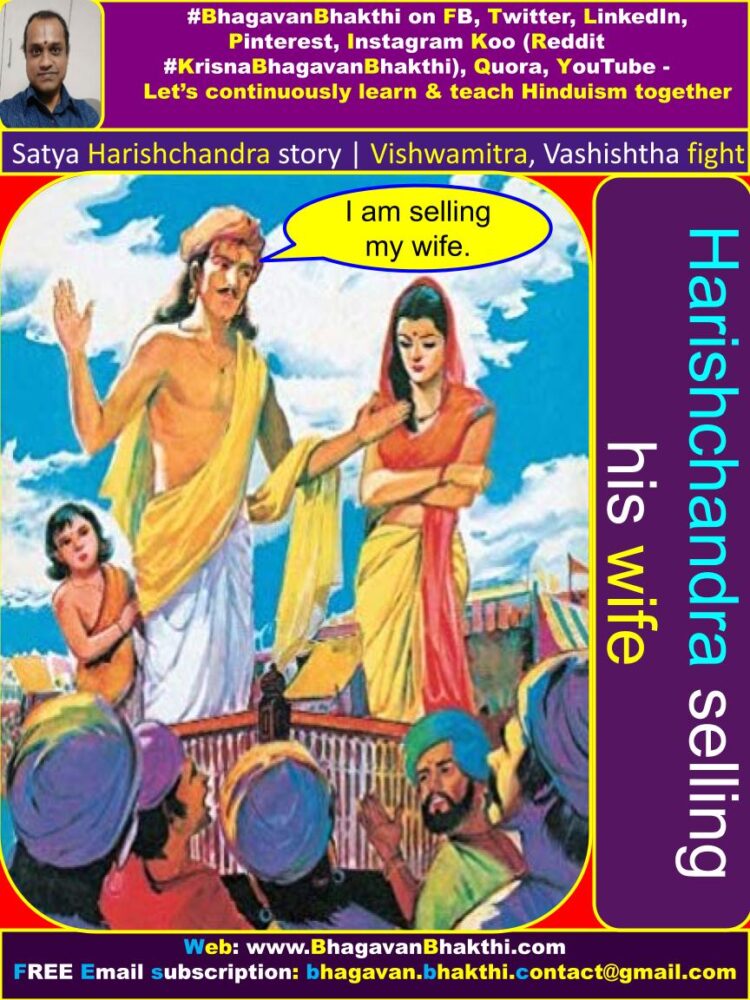
‘Anybody interested in buying my wife, please do so before evening.’
An old Brahmin stepped forward from the crowd and said- ‘I will buy her.’
Hearing his words, King Satya Harishchandra became extremely sad that he could not even utter a word. The Brahmin then stuffed the money in the bark clothes of King Satya Harishchandra and began to drag the queen by her hair.
The boy Rohitashva (Lohitashva) began to cry holding the hem of her mother. Seeing the condition of her son, the queen Shaivya (Taramati) requested the Brahmin- ‘O Arya! Kindly let me see the face of my child for once.’
Then the queen turned towards Rohitashva (Lohitashva) and said- ‘O son! Your mother is no longer free now. She has become a slave. Do not touch me because I have become an untouchable.’
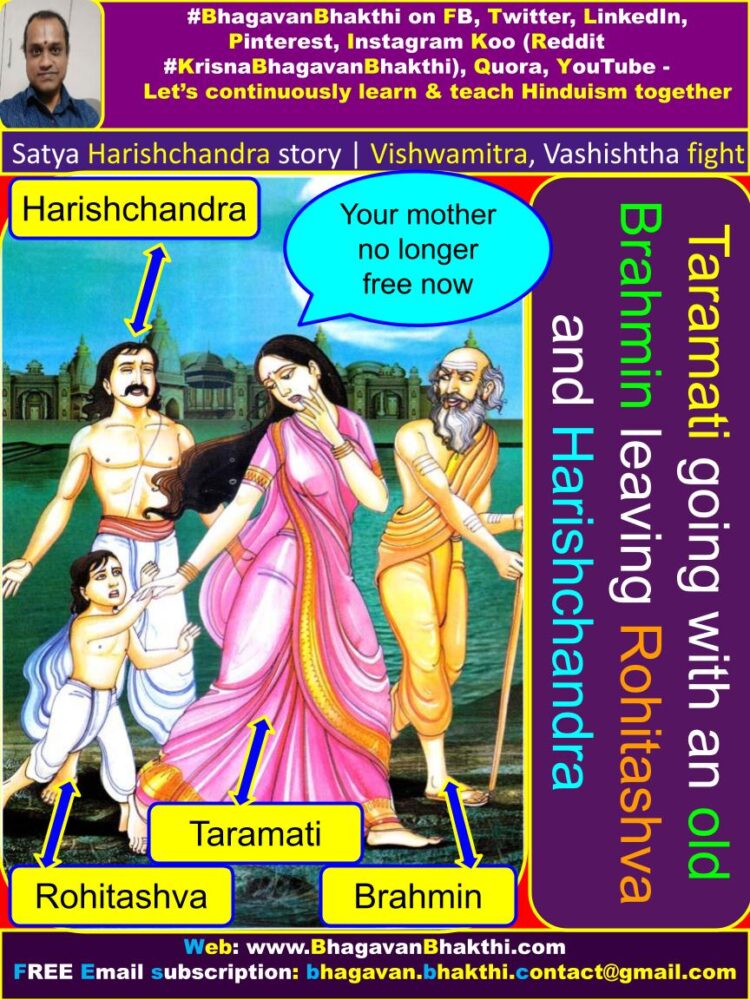
Then the old Brahmin began to forcibly drag the queen Shaivya (Taramati) with him. Rohitashva (Lohitashva) also followed them crying loudly for his mother Shaivya (Taramati). The old Brahmin angrily kicked Lohitashva (Rohitashva). But still the boy did not give up following them.
At last, the queen Shaivya (Taramati) requested the Brahmin- ‘O lord! I will not be able to serve you without my son. So kindly buy him also.’
Hearing the words of the queen Shaivya (Taramati), the Brahmin once again stuffed some more money in the clothes of King Satya Harishchandra and tied the boy with the queen and began to drag both of them.
Meanwhile Maharishi Vishwamitra also appeared there and demanded the Dakshina (donation). King Satya Harishchandra gave him all the money he had got from selling his wife Shaivya (Taramati) and son Lohitashva (Rohitashva).
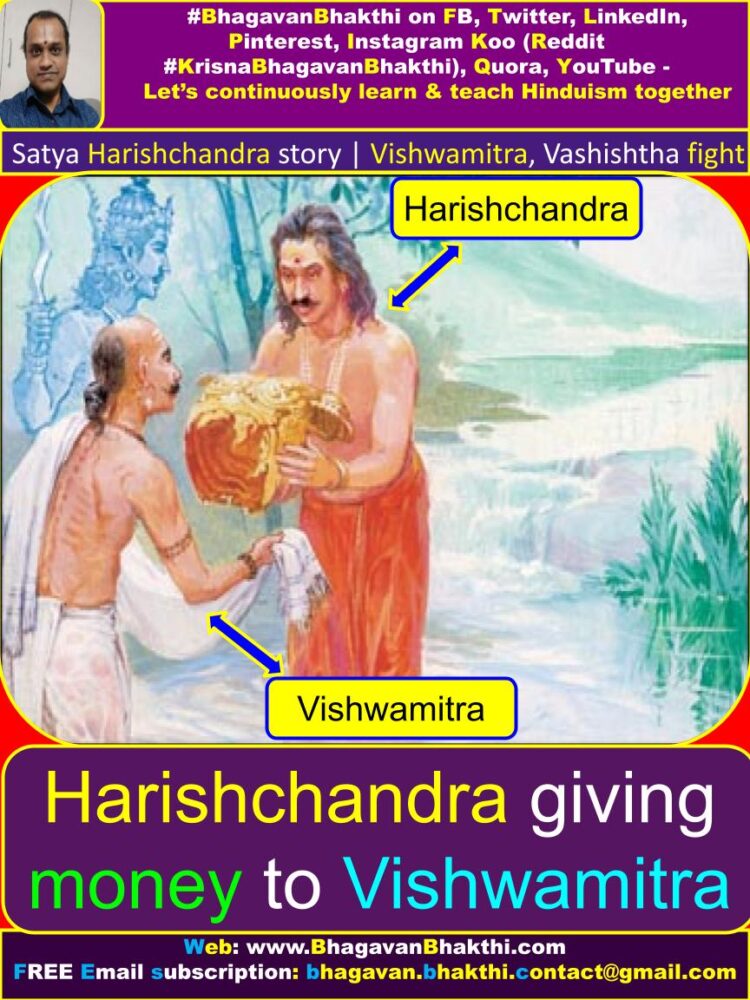
Seeing that amount of money, Maharishi Vishwamitra boiled with anger and said- ‘O wretched among the Kshatriyas!’ ‘You call this small amount of money as Dakshina (donation)! Now look at the powers of my penance.’
King Satya Harishchandra trembled with fear and said- ‘O lord! Please wait a little more.’
Maharishi Vishwamitra said- ‘Now only, a quarter of the day remains. I will wait only for this period and not more.’ Saying this, Maharishi Vishwamitra went away.
With stooped face, King Satya Harishchandra once again said addressing the crowd- ‘Now I am available for sale. Whoever wishes to buy me, please come forward before sunset.’
Dharma (Lord Sri Yama Deva) in the guise of a Chandala stepped forward from the crowd. He had a huge stinking body. He said- ‘I will buy you.’
King Satya Harishchandra asked- ‘Who are you?’ The Chandala said- ‘I am a Chandala. My name is Praveera and I am the resident of this very town.’
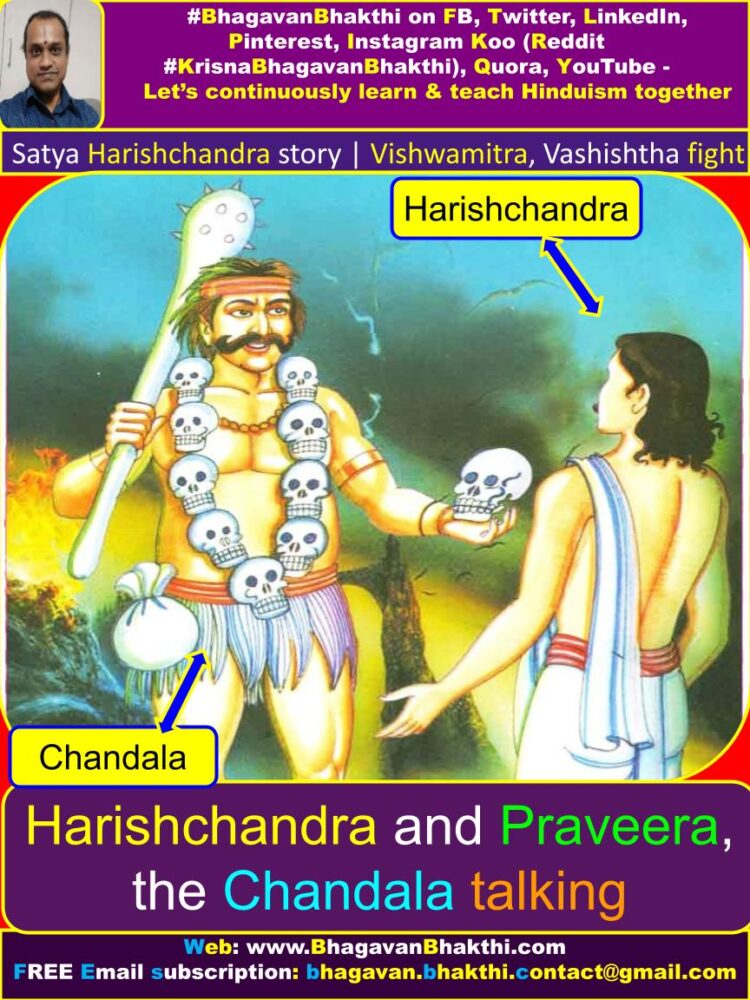
King Satya Harishchandra thought- ‘It is better to accept the curse than accepting the slavery of a Chandala.’
At the same time, Maharishi Vishwamitra also arrived there and said angrily- ‘This Chandala is ready to pay you a lot of money. Why don’t you then pay my Dakshina (donation)?’
King Satya Harishchandra said- ‘O lord! I am born in Suryavansh (Suryavamsha) (Solar Dynasty). Accepting the slavery of a Chandala causes great pain for me.’ ‘I have no money now. Since now onwards, I will be your slave and do whatever you will ask me to do.’
Maharishi Vishwamitra said- ‘If you are my slave and ready to obey me, then I sell you to this Chandaala for 1000 gold coins. Go and become his slave.’
The Chandaala then presented many villages that were spread over an area of 100 Yojanas to Maharishi Vishwamitra and tying King Satya Harishchandra with a rope dragged him to his town.
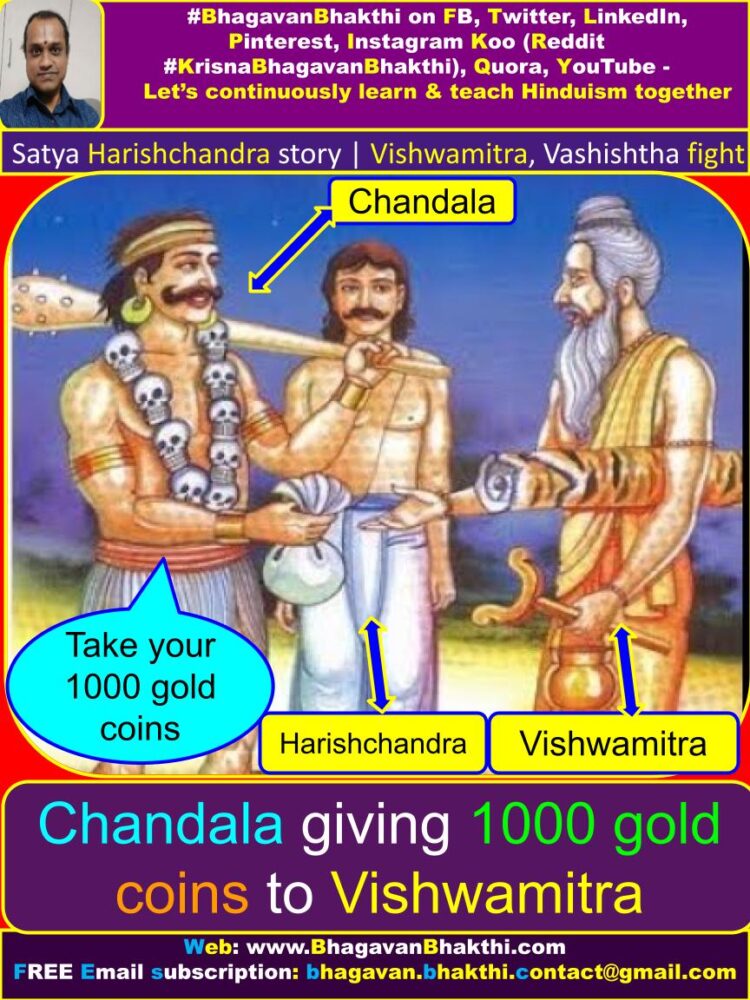
In the Chandaala’s house, King Satya Harishchandra contemplated- ‘The queen must be thinking that I would soon get her freed from the slavery of the old Brahmin after paying his dues. But she does not know that I myself have become the slave of a Chandaala.’
After a few days, the Chandaala appointed King Satya Harishchandra as the supervisor of the cremation place and instructed him to be there present all the time and to cremate each dead body only after thorough investigation.
Chandaala also instructed him to collect the toll for cremating every dead body and divide it in such a way that one sixth part of the toll goes to the king and from the remaining five parts, three parts should be reserved for him he should take only the remaining two parts as his remuneration.
Since that day, King Satya Harishchandra began to live in the cremation ground. King Satya Harishchandra always remembered the glorious days of his kingdom, his queen and his son. He had great regret that just because of the anger of Maharishi Vishwamitra, he lost everything.
Very soon, King Satya Harishchandra’s new found occupation (As a Chandala – Working as cemetery keeper) began to show on his appearance. His hair grew long and was unkempt, his body dry and stinking.
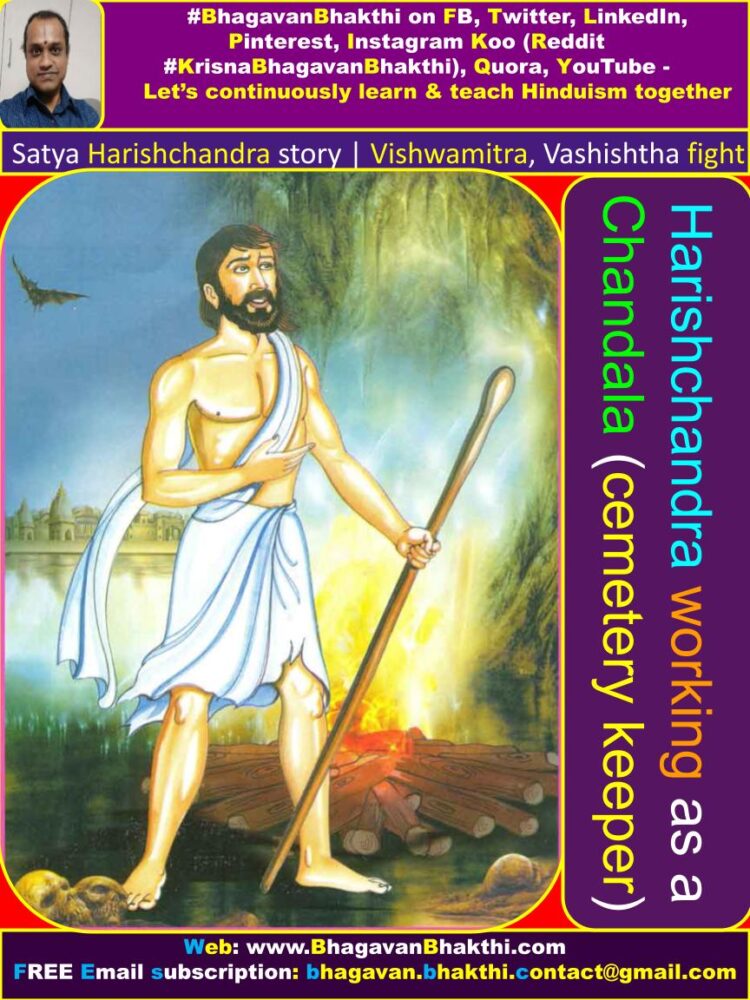
In this guise, King Satya Harishchandra began to roam in the cremation ground always carrying a stick in his hand. His whole day passed in the assessment of the cremation toll and its division among the various claimants.
King Satya Harishchandra had lost his mental stature as he even forgot the count of the days and could not distinguish between the day and night.
One day, a snake bit Rohitashva (Lohitashva) as a result of which, he died. Shaivya (Taramati) brought Rohitashva (Lohitashva), crying and wailing to the cremation ground. Even in the unkempt guise, she recognized King Satya Harishchandra.
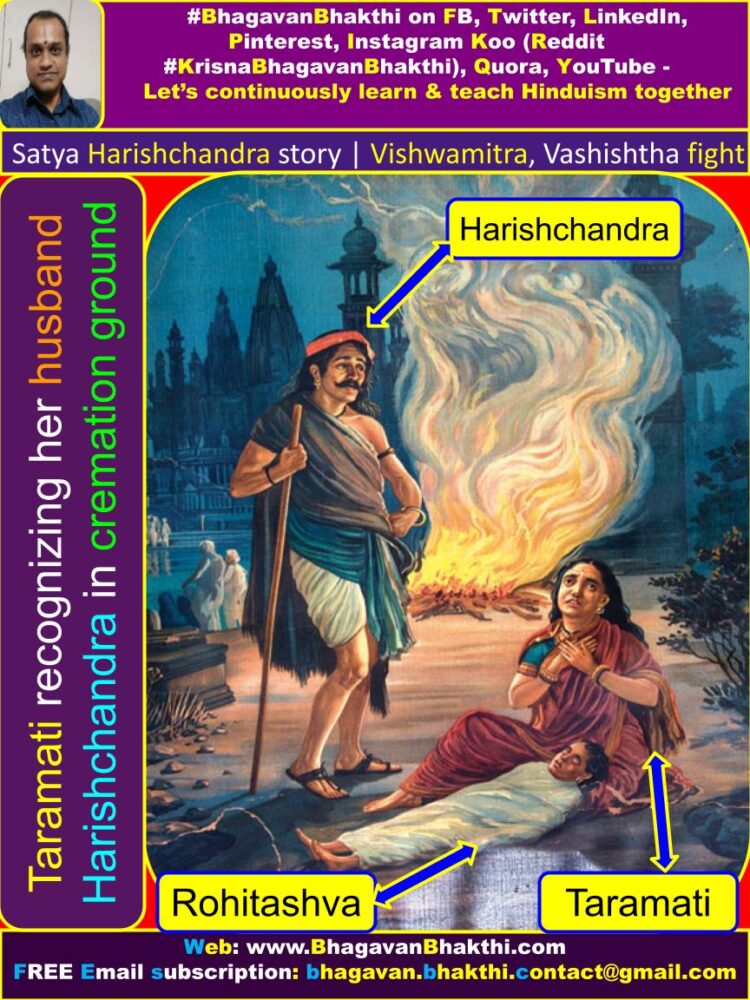
Hearing her wailing, King Satya Harishchandra went near her expecting to get the clothes of the deceased. There he saw a woman carrying a dead boy wrapped in a black cloth.
King Satya Harishchandra could not recognize queen Shaivya (Taramati), but the royal appearance of the boy forced him to think- ‘To which royal family did this unfortunate boy belong to? How pitiable, the cruel Kaal did not even spare this boy. My son Rohitashva (Lohitashva) would have attained the same age by now.’
His silence further hurt the queen who said- ‘O lord! O king! How come, you have been living here without caring for your wife and son?’
‘We have already lost our kingdom. Now, we have lost our son also. O destiny! Did you not destroy everything of King Satya Harishchandra?’
King Satya Harishchandra began to think who that woman could be and who that dead boy was? ‘Isn’t she my wife?’ Thus recognizing his wife and dead son, King Satya Harishchandra began to cry loudly and fainted.
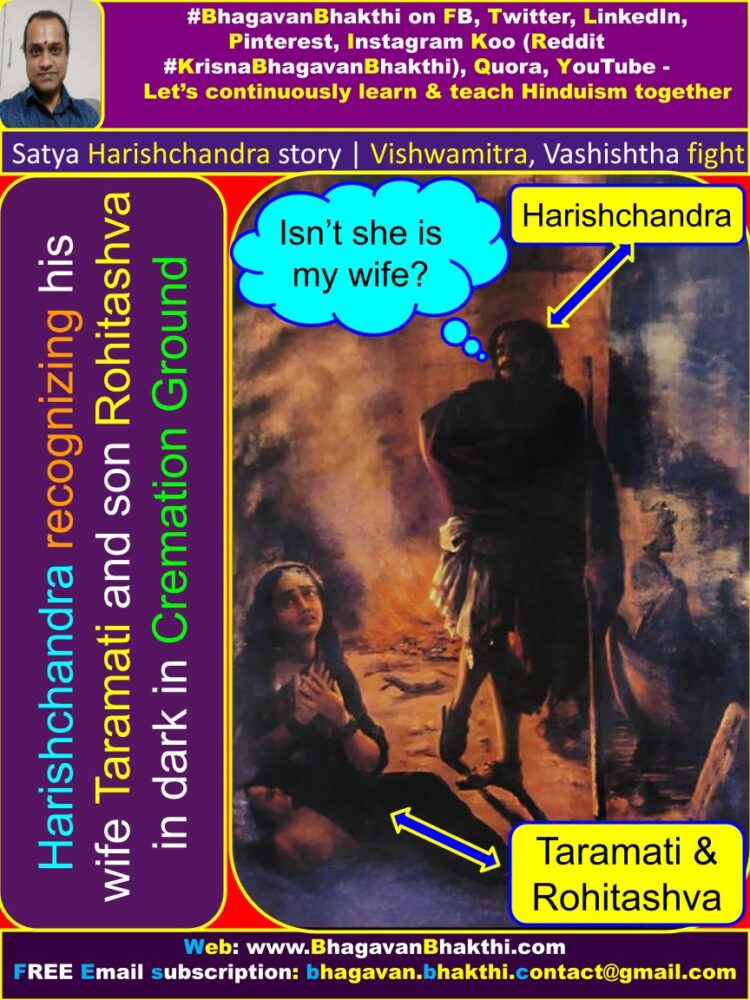
The queen after seeing her husband’s condition fainted too. After sometime both of them regained their consciousness. Then the king took the dead boy in his lap and once again fainted.
Queen Shaivya (Taramati) began to wonder why King Satya Harishchandra was staying in the cremation ground. For a moment, she forgot her sorrow and began to look at her fainted husband.
Later she noticed the stick in King Satya Harishchandra’s hand. Usually Chandaalas used to carry that kind of stick.
She became dejected with the thought that she had become the wife of a Chandaala. She then began to curse the destiny and began to wail embracing King Satya Harishchandra and said-
‘O king! I don’t know whether I am dreaming or it is a reality. I have lost the power of thinking.’
Hearing the words of the queen, the king opened his eyes and narrated the whole events that led to his becoming a Chandaala. Then the queen narrated her experiences and how their son Rohitashva (Lohitashva) died because of snakebite.
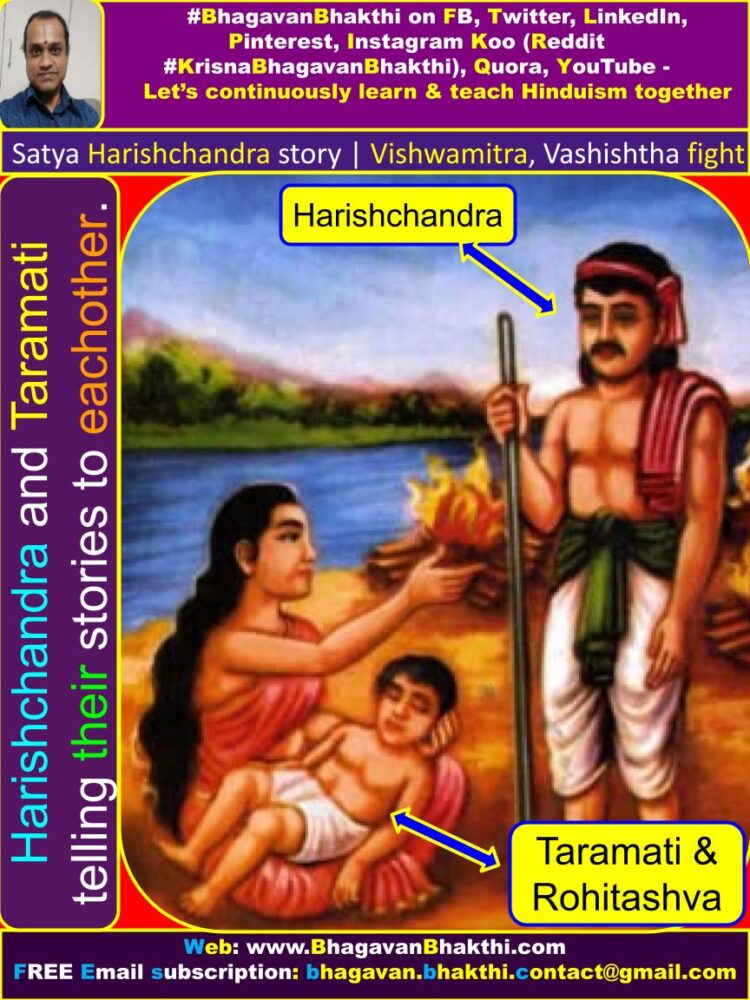
King Satya Harishchandra fell on the ground and began to hug his dead son. He was wailing- ‘How unfortunate I am that even my wishes are not under my control. Without the permission of the Chandaala,
King Satya Harishchandra continued, I cannot even commit self-immolation. But now, I will not differentiate between the sin and virtuosity. I will destroy my body in the pyre of my son.’
The queen said- ‘O king! I am also unable to bear the burden of sorrows. I will also commit immolation with you.’ ‘Then all three of us will stay unitedly in the heaven. It won’t matter to us even if we suffer the tortures of hell.’
Then the king arranged a huge pyre and put his dead son on it. With the queen, he began to pray to God. Just then all the deities arrived there led by Dharma (Lord Sri Yama Deva). Sage Maharishi Vishwamitra also accompanied them. They praised King Satya Harishchandra.
Then Dharma (Lord Sri Yama Deva), Lord Sri Indra Deva and Maharishi Vishwamitra came closer to the king Satya Harishchandra.
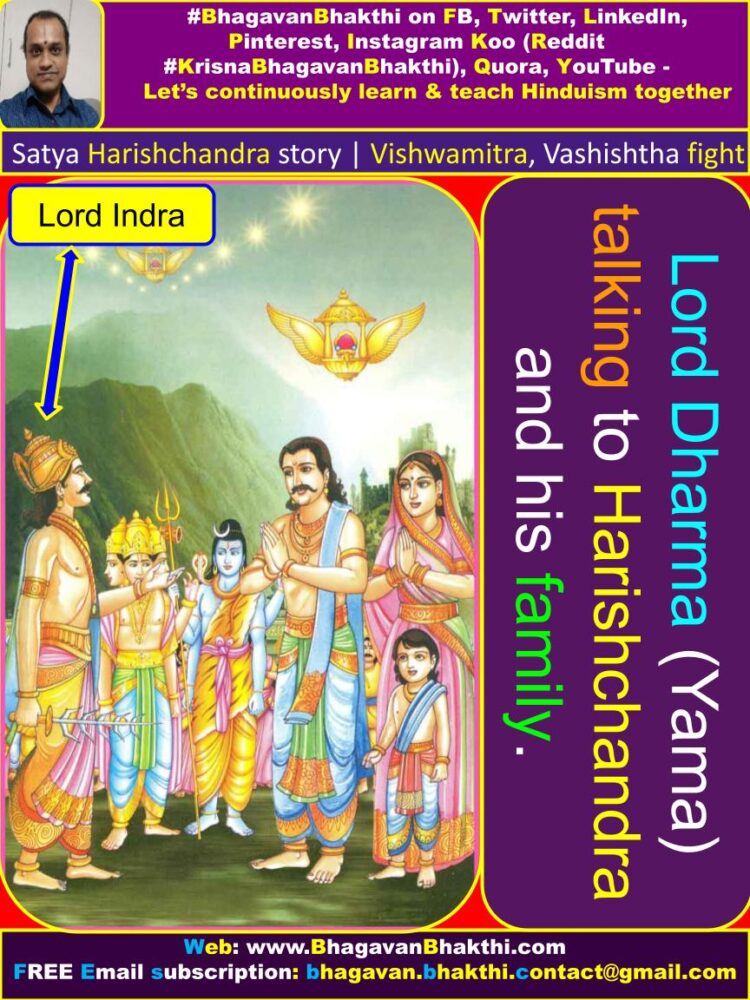
Dharma said- ‘O king! You have satisfied me with your merits like patience, endurance, truthfulness etc.’
Lord Sri Indra Deva said- ‘King Satya Harishchandra, you are very fortunate. You have won our hearts along with your wife and son.’ ‘You have even won the heaven with your action. I invite you to stay in heaven along with your wife and son.’
Then Lord Sri Indra Deva sprinkled ambrosia on the dead Rohitashva (Lohitashva). Rohitashva (Lohitashva) got up and sat up in no time. King Satya Harishchandra, his wife and son Rohitashva (Lohitashva) were clad in divine clothes and garlands.
Lord Sri Indra Deva invited them to stay in the heaven forever, but King Satya Harishchandra said- ‘O king of the deities! Without the permission of this Chandaala, I cannot go anywhere.
‘Yama Dharma said- ‘O king! I had learnt in advance about the miseries you would suffer in future. That’s why I took the guise of a Chandaala and showed you all the grotesque action.’
Lord Sri Indra Deva once again invited them to heaven but once again, King Satya Harishchandra refused saying that – ‘In Kosala, people must have been living mournfully in his absence. I cannot leave them in that pitiable condition to enjoy the comforts of the heaven’, said King Satya Harishchandra.
Then, Lord Sri Indra Deva, Dharma (Lord Sri Yama Deva) and Maharishi Vishwamitra led King Satya Harishchandra to Ayodhya, the capital of Kosala. There they carried out the coronation of Rohitashva (Lohitashva).
Thereafter, they took King Satya Harishchandra and his queen Shaivya (Taramati) to the heaven. When, King Satya Harishchandra attained his heavenly abode, their family priest, Maharishi Vashishtha re-emerged from water.
Maharishi Vashishtha came to know about the entire development. He was angry at Maharishi Vishwamitra’s stubbornness. He at once cursed Vishwamitra to become a stork. On the other hand Maharishi Vishwamitra cursed Maharishi Vashishtha to become a partridge.
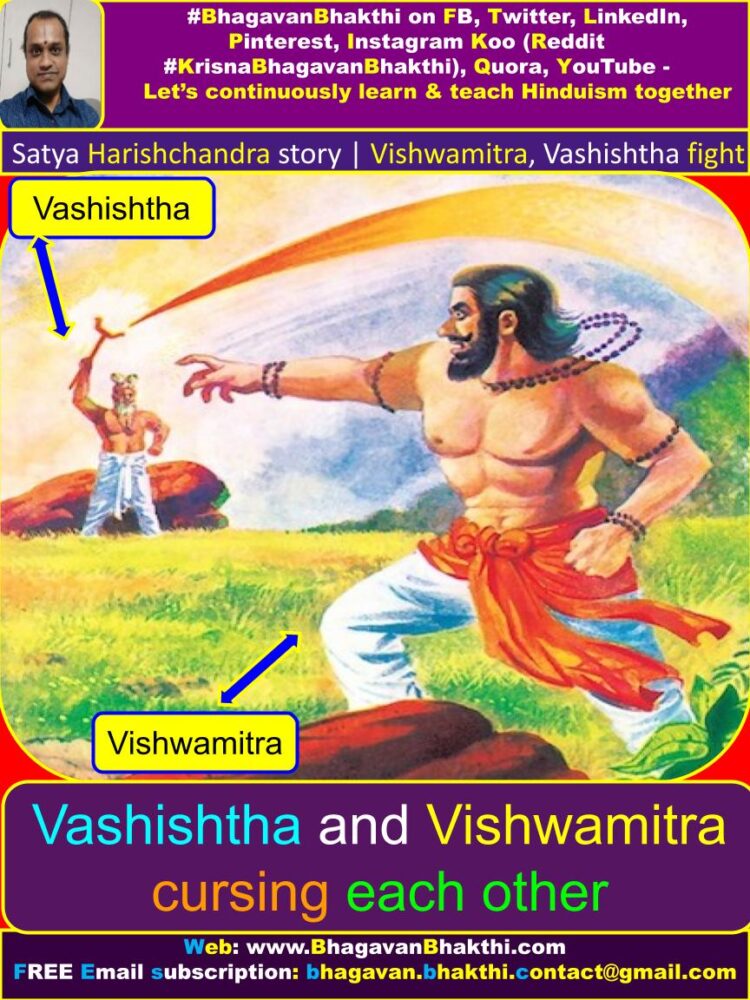
Thus both of them turned into birds and began to fight. Their fight caused great panic all around. At last accompanied by the deities, Brahma himself arrived at the scene and dissuaded the birds from fighting. But Brahma could not convince them and they continued to fight.
Brahma then destroyed their avian appearances and both the sages regained their original form. Their enmity too ended at the same time.
Brahma explained to them that Maharishi Vishwamitra had not done any harm to King Satya Harishchandra. In fact he had felicitated Harishchandra’s ascend to the heaven.
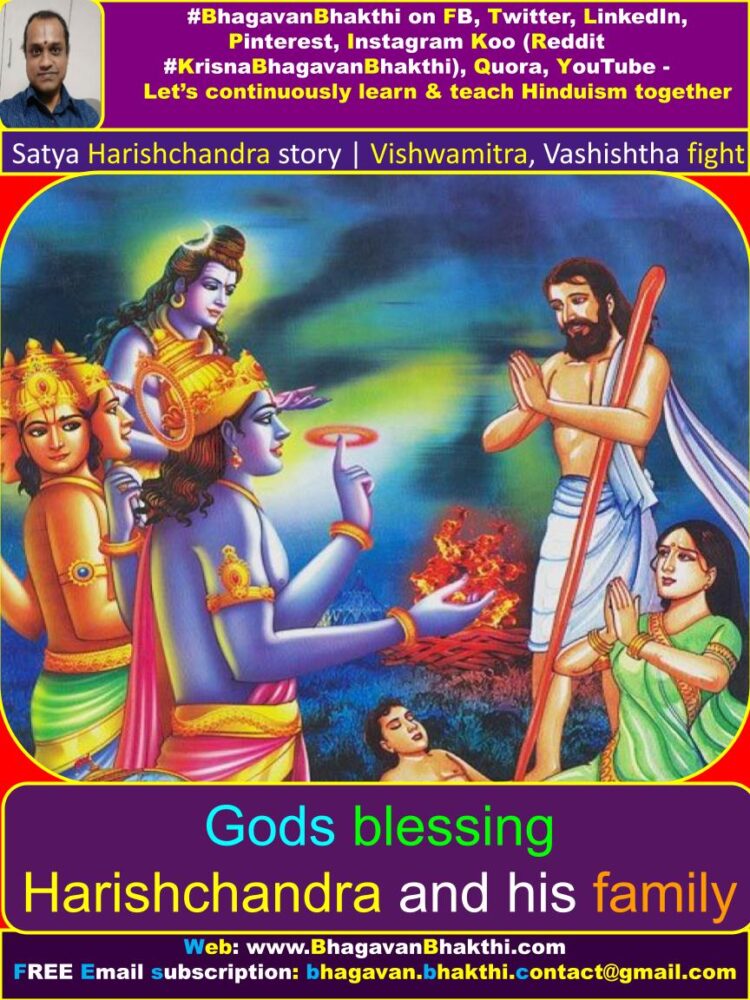
Both the sages felt ashamed and they embraced each other before leaving for their respective hermitages.
Story of King Satya Harishchandra, his son Rohitashva (Lohitashva) and Lord Sri Varuna Deva is as given below:
In the Ikshvaku kingdom there ruled a raja named King Satya Harishchandra. King Satya Harishchandra had no son. One day two Rishi-muni named Narada and Parvata came to visit King Satya Harishchandra and told him that he would go to Narakam (Hell) if he did not have a son.
How can I obtain a son? asked Harischchandra.
Go to the banks of the Gautami Ganga (or Godavari) advised the vipras (devotees of Lord Sri Vishnu).
Make prarthana (pray) to the Lord Sri Varuna Deva there. We are sure that Lord Sri Varuna Deva will grant you a son. King Satya Harishchandra pleased Lord Sri Varuna Deva with his prayer and asked for a son.
You will have a son, said Lord Sri Varuna Deva. But there is a regulation for it. You will have to subsequently organize a yajnam in my respect and you will have to make sacrifice) of your son at this yajna. Tell me if this regulation) is acceptable to you.
Yes indeed, replied King Satya Harischchandra.
Later, King Satya Harishchandra had a son who’s name) was Rohitashva (Lohitashva).
Lord Sri Varuna Deva came to King Satya Harishchandra and asked, What about the yajna in my respect?
Please let my son grow his teeth, replied King Satya Harishchandra. Animals are made sacrifice at yajnas. And no one becomes a animals until he actually has teeth.
Lord Sri Varuna Deva waited till the teeth grew and returned When Rohitashva (Lohitashva) was seven years of age. What about the yajna in my respect? Lord Sri Varuna Deva asked.
These are only milk teeth, replied King Satya Harishchandra. These do not characteristics of an animal. Please wait until his proper teeth have grown.
Lord Sri Varuna Deva returned back when the proper teeth grew and asked, What about the yajna in my respect?
He is the son of a Kshatriya replied King Satya Harishchandra. But his education in the art of warfare has not even made started.
He cannot be called a Kshatriya until he knows how to fight in war. Till that day he is an imperfect human.
Do you really want such an imperfect human as a sacrifice?
After some years had passed, Rohitashva (Lohitashva) became skilled in the art of war and was appointed as the Yuvaraja (Prince) to the Kingdom. He was then sixteen years of age.
Lord Sri Varuna Deva appeared again and asked, What about the yajna in my respect)?
This time the entire conversation took place in front of the Yuvaraja (Prince) and Rohitashva (Lohitashva) intervened before King Satya Harishchandra could say anything.
Father, he said I have already resolved to perform a yajna in Lord Sri Vishnu’s respect. Please give me grants to complete that first. After that, do what you will.
Rohitashva (Lohitashva) went off to the forest. Meanwhile, Lord Sri Varuna Deva had enough and he made King Satya Harishchandra to have a painful stomach ailment.
News of his father’s disease was taken to Rohitashva (Lohitashva) in the forest. In the forest, Rohitashva (Lohitashva) met a Rishi named Rishi Ajigarata.
The Rishi was a poor brahmana and, together with his wife and three sons all were starving.
Will you sell one of your three sons to me? asked Rohitashva (Lohitashva). The boy is needed for a yagnam.
I shall not sell my eldest son, said the Rishi. My wife will not permit the youngest one to be sold. You can have the one in the middle. His name is Shunahshepha.
The amount will be one sahasra Go (one thousand Cows), one sahasra swarna naanyam (one thousand golden coins), one sahasra (one thousand) pieces of clothing and a lot of aishwaryam (wealth).
Rohitashva (Lohitashva) paid the price and brought Shunahshepha to house and near King Satya Harishchandra.
We can’t do this, said King Satya Harishchandra. It is the kartavyam (duty) of every raja to protect the brahmanas.
How can we make sacrifice of the son of a brahmana? It is better to die instead. Go and return Shunahshepha to his father.
Just then a divine voice was heard from the sky. The divine voice said, There is no need for anyone to die. Take Shunahshepha to the banks of the Gautami Ganga (or Godavari) and perform the yajna to Lord Sri Varuna Deva there.
Gautami Ganga is such a holy river that no human sacrifice are needed if a yajna is performed there. This is what King Satya Harishchandra did and Lord Sri Varuna Deva got satisfied). As for Shunahshepha, he became the adopted son of the Maharshi Vishvamitra.
PS: Here it should be noted that a raja (king) did his kartavyam (duty) completely by saving his praja / citizens. A putra / son became a pitru vachana paripaalaka (a son who follows the order of his father according to Dharmic way).
And off course King Satya Harishchandra as per his words, completely satisfied Lord Sri Varuna Deva’s words as per the vachana (words) given.
Continue reading about Kings in Hinduism (Sanatana Dharma) – Kings in Hinduism (Sanatana Dharma)
More information will be added to this on regular basis. Please visit this post after some time to get updated information.
Let’s know more info about Hinduism (Sanatana Dharma) and Bhagavan Lord Sri Krishna (Vishnu) by clicking the below link:
Lord Sri Vishnu stories, information, facts, significances, etc.
To watch videos on #Hinduism #Sanskrit language, SUBSCRIBE to my YouTube channel from this below link:
#BhagavanBhakthi YouTube channel
Dear friends, if you need any clarifications about this post, kindly let me know, I will definitely try to answer all of them.
Also your one LIKE, one COMMENT, One Share, one SUBSCRIPTION is highly important.
This will help to know the quality of this content and also it will be helpful to know if any improvements is required for the content.
If you feel this content is useful to you and has helped you to improve your knowledge, kindly share this with your well-wishers.
Because “SHARING MEANS CARING”.
To receive FREE EMAIL SUBSCRIPTION about #BhagavanBhakthi, you can send an email to [email protected] from your email ID.
NAMASTE!
SRI GURUBHYO NAMAHA
OM NAMO NARAYANAYA
Sri Krishnaarpanamastu
Subscribe / Follow us Share in Social Media